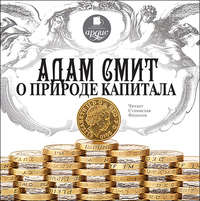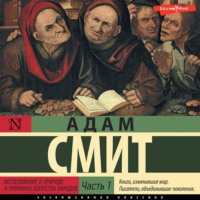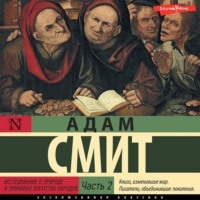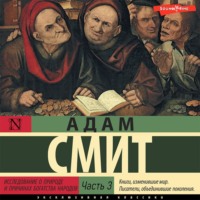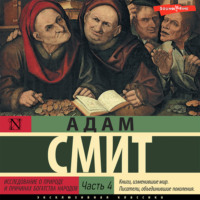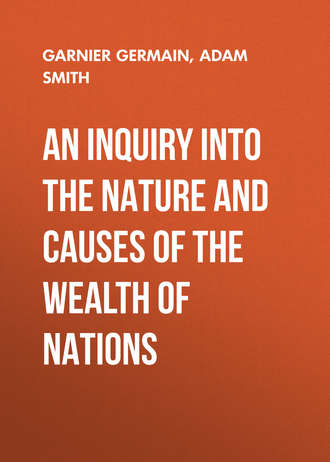 полная версия
полная версияAn Inquiry Into the Nature and Causes of the Wealth of Nations
'A great and leading object of Mr. Smith's speculations,' as Mr. Stewart also observes, 'is to demonstrate, that the most effectual plan for advancing a people to greatness, is to maintain that order of things which nature has pointed out, by allowing every man, as long as he observes the rules of justice, to pursue his own interest in his own way, and to bring both his industry and his capital into the freest competition with these of his fellow citizens.'
Several authors, in this country, had before written on commercial affairs, but Mr. Smith was the first who reduced to a regular form and order the information that was to be obtained on that subject, and deduced from it the policy which an enlightened commercial nation ought to adopt. The successful manner in which he has treated this unlimited freedom of trade, as well as some others, and his able exposure of the errors of the commercial system, have rendered the science of which he treats highly interesting to the great body of the people; and a spirit of inquiry, on every branch of political economy, has, in consequence, been excited, which promises now, more than ever, to be attended with the most beneficial effects. This intricate science, the most important to the interests of mankind though long neglected, Dr. Smith has had the merit of advancing so far, as to lay a foundation, on which, it may safely be said, investigation may for a long time proceed.
It has frequently been alleged, that Dr. Smith was indebted for a large portion of the reasonings in his Inquiry to the French economists, and that the coincidence between some branches of his doctrine and theirs, particularly those which relate to freedom of trade and the powers of labour, is more than casual. But Professor Stewart has ably vindicated him from this charge, and established his right to the general principles of his doctrine, which, he thinks, were altogether original, and the result of his own reflections. That he, however, derived some advantage from his intimacy with Turgot, and those great men who were at the head of the sect of economists, and, perhaps, adopted some of their illustrations, it would be as unnecessary to deny, as it would he far from discreditable to his talents to acknowledge.
There is also a similar, or perhaps a greater coincidence between many parts of his doctrine and the opinions of Sir James Stewart, as detailed in his 'Inquiry into the Principles of Political Economy.' This congruity of opinion is chiefly apparent in their respective conclusions concerning the effects of competition, – the principles of exchangeable value, – the relation between the interest of money and the profit of stock, – the functions of coin, – the rise and progress of credit, – and the sources and limits of taxation. As this author had published his Inquiry many years before Dr. Smith's work appeared, and had, besides, lived in great intimacy with him, there was some reason to believe, what has been often asserted, that he possessed a just claim to some of the doctrines contained in that work, though Dr. Smith never once mentioned his name in any part of his work. But the present Sir James Stewart, who has recently published a full edition of the writings of his father, relinquishes, on his part, all such pretensions. With the partiality of a friend, in ranking his father with Dr. Smith, he gives it as his opinion, however, that both had, with original powers of equal strength, drawn their knowledge from the same source, the French economists.
Dr. Mandeville has also, of late, got the credit of being the author of those Principles of Political Economy, which have interested the world for the last fifty years, and to him alone, it is said, not only the English, but also the French writers, are indebted for their doctrines in that science. In the work of this eccentric writer, there seems, indeed, a similarity of opinion on some of the more obvious sources of wealth, particularly in the division of labour, which Dr. Smith investigates so fully; and in the erroneous doctrine of productive and non-productive labour; and also, perhaps, on some other points: but it would be difficult to show, that he ought, on this account, to be considered the author of all, or even the chief part of what has been written on the subject. On this, as well as on all questions of a similar nature, a great diversity of opinions will subsist. But it may be a matter of curiosity to those who are unacquainted with his work, the Fable of the Bees, not only to trace the connection of that author's sentiments with what is advanced by subsequent writers on this important subject, but also to learn his peculiar notions of morality, that attracted, at one time, so much attention. These last, Dr. Smith says, though described by a lively and humorous, yet coarse and rustic eloquence, which throws an air of truth and probability on them, are, almost in every respect, erroneous.
Soon after the publication of the Wealth of Nations, Mr. Smith received the following congratulatory letter from Mr. Hume, six months before his death, dated Edinburgh, 1st April 1776.
'Euge! Belle! Dear Mr. Smith – I am much pleased with your performance, and the perusal of it has taken me from a state of great anxiety. It was a work of so much expectation, by yourself, by your friends, and by the public, that I trembled for its appearance; but am now much relieved; not but that the reading of it necessarily requires so much attention, and the public is disposed to give so little, that I shall still doubt for some time of its being at first very popular. But it has depth, and solidity, and acuteness, and is so much illustrated by curious facts, that it must at last take the public attention. It is probably much improved by your last abode in London. If you were here at my fireside, I should dispute some of your principles. But these, and a hundred other points, are fit, only to be discussed in conversation. I hope it will be soon, for I am in a very bad state of health, and cannot afford a long delay.'
The publication of this great work drew praise to its author, indeed, from many different quarters. – Dr. Barnard, in a political epistle, addressed to Sir Joshua Reynolds, where the characteristic qualities of some eminent literary men of that time are brought forward, spoke of Smith as one who would teach him how to think. Gibbon made honourable mention of him in his Roman history; and Mr. Fox contributed, in no small degree, to extend his reputation, by observing in the House of Commons, that 'the way, as my learned friend Dr. Adam Smith says, for a nation, as well as an individual, to be rich, is for both to live within their income.'
The opinion which Dr. Johnson delivered, at that time, on its being alleged by Sir John Pringle, that a person who, like Dr. Smith, was not practically acquainted with trade, could not be qualified to write on that subject, may also be mentioned here, though somewhat erroneous, as far as it respects the received doctrines of Political Economy: – 'He is mistaken,' said Johnson. 'A man who has never been engaged in trade himself, may undoubtedly write well on trade; and there is nothing which requires more to be illustrated by philosophy than trade does. As to mere wealth, that is to say, money, it is clear that one nation, or one individual, cannot increase its store but by making another poorer; but trade procures what is more valuable, the reciprocation of the peculiar advantages of different countries. A merchant seldom thinks of any but his own trade. To write a good book upon it, a man must have extensive views. It is not necessary to have practised, to write well upon a subject.'2
On the Inquiry into the Causes of the Wealth of Nations, it only remains farther to be observed, that its success has been every way commensurate to its merits. It has, however, been often regretted, that the author did not live to favour the world with his reasonings on those important events which have taken place since 1784, when he put the last hand to his invaluable work. That another, with competent talents, and a mind disposed to the task, should soon appear, to treat of these occurrences, and give a satisfactory view of the progress of the science from that time to the present, is not to be expected. But as the honour to be gained from a successful execution of such an undertaking is very considerable, it is not to be wondered at that an attempt of this kind should be made. Accordingly, Mr Playfair of London has had the boldness to follow Smith, by endeavouring to supply, in part, this desideratum, by adding supplementary chapters and notes to the Treatise on the Wealth of Nations.
But it is greatly to be feared, that there are few persons who have read this improved edition, as it is called, of Dr. Smith's Inquiry, but will still look forward to the accomplishment of the wishes they must previously have formed, for a continuation, and probably an illustration, of the discussions contained in that work. Leaving, therefore, the supplementary chapters and elucidations of Mr Playfair, it must be observed, that Dr. Smith has, on this occasion, been equally unfortunate in a biographer. The detail of his peaceful life is almost lost among dissertations on the wickedness of atheism and the horrors of a revolution. But these dissertations, strangely misplaced as they appear to be, would certainly not alone have been sufficient to attract observation here, whatever latitude the author might have allowed to himself on such subjects. When he goes on, however, to apologise for Dr. Smith's acquaintance with some individuals among the economists, and to connect the whole of that sect with those philosophers to whom he ascribes the evils which have so long afflicted France, his opinions become still more insupportable. It will, perhaps, be said, and with some reason, that, in this instance, at least, the writer has followed those alarmists, who, on any men of learning belonging to that country being mentioned, immediately ally them to the revolutionists without regard to difference of opinion, or distance of time.
The reputation, however, of the economists is too well established to be affected, either by the clamours of the ignorant, or the mad intemperance of political alarmists. The doctrine of the great men who formed the school of the economists, was, that the produce of the land is the sole or principal source of the revenue and wealth of every country; and this doctrine, with the manner of deriving from it the greatest possible advantage, it is almost universally acknowledged, engaged entirely their attention. Dr. Smith, who lived in great intimacy with many of the founders of that sect, does ample justice, on every occasion, to the purity of their views; and indeed they, as well as himself, it has always been said, by the impartial and well informed, were ever animated by a zeal for the best interests of society.
M. Quesnai, the first of that sect, and the author of the Economical Table, a work of the greatest profoundness and originality, was, in particular, represented by Mr. Smith as a man of the greatest modesty and simplicity; and his system he pronounced, with all its imperfections, to be the nearest approximation to the truth, of any that had then been published on the principles of political science. His veneration for this worthy man was even so great, that had he lived, it was his intention to have inscribed to him the Inquiry into the Causes of the Wealth of Nations.
Nor will the memory of those illustrious men be soon forgotten, notwithstanding the calumnies with which it has been charged. It may safely be predicted, in the words of a highly respectable periodical publication, that 'Those prospects of political improvements which flattered the benevolent anticipations of the economists, will soon be recognised as sound conclusions of science; and it will at length be acknowledged that Turgot, Mirabeau, and Quesnai, were the friends of mankind, and that their genius and their labours were devoted to the refinement of social happiness and the consolidation of the political fabric.'3
The life of Mr. Smith, after the publication of his Inquiry, might be said to draw towards a close. The following particulars of the last years, are mostly extracted from Professor Stewart's Life of this incomparable writer.
After residing some time in London, he was appointed one of the commissioners of customs in Scotland, in 1778, when he removed to Edinburgh. He was accompanied by his mother, who, though in extreme old age, possessed a considerable share of good health; and his cousin, Miss Douglass, who had long resided with him at Glasgow, undertook to superintend his domestic economy.
The Duke of Buccleugh had continued to allow Mr. Smith L.300 a-year, and the accession which he now received to his income enabled him to live, not only with comfort and independence, but to indulge the benevolence of his heart, in making numerous private benefactions.
During the remaining period of his life, he appears to have done little more than to discharge, with peculiar exactness, the duties of his office, which, though they required no great exertion, were sufficient to divert his attention from his studies. He very early felt the infirmities of old age, but his health and strength were not greatly affected till he was left alone, by the death of his mother, in 1784, and of his cousin four years after. They had been the objects of his affection for more than sixty years; and in their society he had enjoyed, from his infancy, all that he ever knew of the endearments of a family. In return for the anxious and watchful solicitude of his mother during infancy, he had the singular good fortune of being able to show his gratitude to her during a very long life; and it was often observed, that the nearest avenue to his heart was through his mother.
He now gradually declined till the period of his death, which happened in 1790. His last illness, which arose from a chronic obstruction in the bowels, was lingering and painful; but he had every consolation to soothe it which he could desire, from the tenderest sympathy of his friends, and from the completest resignation of his own mind.
His friends had been in use to sup with him every Sunday. The last time he received them, which was a few days before his death, there was a pretty numerous meeting; but not being able to sit up as usual, he retired to bed before supper. On going away, he took leave of the company, by saying, 'I believe we must adjourn this meeting to some other place.'
In a letter addressed, in the year 1787, to the principal of the university of Glasgow, in consequence of his being elected rector of that learned body, a pleasing memorial remains of the satisfaction with which he always recollected that period of his literary career, which had been more peculiarly consecrated to his academical studies. On that occasion he writes: —
'No preferment could have given me so much real satisfaction. No man can owe greater obligations to a society than I do to the university of Glasgow. They educated me; they sent me to Oxford. Soon after my return to Scotland, they elected me one of their own members, and afterwards preferred me to another office, to which the abilities and virtues of the never-to-be-forgotten Dr. Hutcheson had given a superior degree of illustration. The period of thirteen years, which I spent as a member of that society, I remember as by far the most useful, and therefore, as by far the happiest and most honourable period of my life; and now, after three-and-twenty years absence, to be remembered in so very agreeable a manner by my old friends and protectors, gives me a heart-felt joy which I cannot easily express to you.'
Not long before the death of Smith, finding his end approach rapidly, he gave orders to destroy all his manuscripts, excepting some detached essays, which he entrusted to the care of his executors. With the exception of these essays, all his papers were committed to the flames. What were the particular contents of these papers was not known, even to his most intimate friends. The additions to the Theory of Moral Sentiments, most of which were composed under severe illness, had fortunately been sent to the press in the beginning of the preceding winter; and the author lived to see the publication of this new edition.4
Some time before his last illness, when he had occasion to go to London, he enjoined his friends, to whom he had entrusted the disposal of his manuscripts, to destroy, in the event of his death, all the volumes of his lectures, doing with the rest what they pleased. When he had become weak, and saw the last period of his life approach, he spoke to his friends again upon the same subject. They entreated him to make his mind easy, as he might depend upon their fulfilling his desire. Though he then seemed to be satisfied, he, some days afterwards, begged that the volume might be immediately destroyed; which was accordingly done.
Mr. Riddell, an intimate friend of Mr. Smith, mentions, that on one of these occasions he regretted he had done so little; 'but I meant,' he added, 'to have done more; and there are materials in my papers of which I could make a great deal. – But that is now out of the question.'
That the idea of destroying such unfinished works as might be in his possession at the time of his death, was not the effect of any sudden or hasty resolution, appears from the following letter to Mr. Hume, written in 1773, at the time when he was preparing for a journey to London, with the prospect of a pretty long absence from Scotland.
'My dear friend, – As I have left the care of all my literary papers to you, I must tell you, that except those which I carry along with me, there are none worth the publication, but a fragment of a great work, which contains a history of the astronomical systems that were successively in fashion down to the time of Descartes. Whether that might not be published as a fragment of an intended juvenile work, I leave entirely to your judgment, though I begin to suspect myself, that there is more refinement than solidity in some parts of it. This little work you will find in a thin folio paper book in my back-room. All the other loose papers which you will find in that desk, or within the glass folding-doors of a bureau, which stands in my bed-room, together with about eighteen thin paper folio books, which you will likewise find within the same glass folding doors, I desire may be destroyed without any examination. Unless I die very suddenly, I shall take care that the papers I carry with me shall he carefully sent to you.'
But he himself long survived his friend Mr. Hume. The persons entrusted with his remaining papers were Dr. Black and Dr. Hutton, his executors, with whom he had long lived in habits of the closest friendship. These gentlemen afterwards collected into a volume, such of the writings of Dr. Smith as were fitted for publication: and they appeared in 1795, under the title of Essays on Philosophical Subjects. These essays had been composed early in life, and were designed to illustrate the principles of the human mind, by a theoretical deduction of the progress of the sciences and the liberal arts. The most considerable piece in this volume is, on the principles which lead and direct philosophical inquiries, illustrated by the history of astronomy, ancient physics, and ancient logic and metaphysics. The others, with the exception of an essay on the external senses, relate to the imitative and liberal arts. The contents of this volume, Mr. Smith's executors observe, appear to be parts of a plan he once had formed for giving a connected history of the liberal sciences and elegant arts; but which he had been obliged to abandon, as being far too extensive; and these parts lay beside him neglected till after his death. In them, however, will be found that happy connection, that full and accurate expression, and the same copiousness and facility of illustration, which are conspicuous in the rest of his writings.
As a writer, the character of Mr. Smith is so well known, that any observation on his merits, must appear almost unnecessary. His literary fame is circumscribed by no ordinary limits. To the voice of his own country, is added the testimony of Europe, and, indeed, of the civilized world. And had even only one volume of his inestimable writings appeared, his name would have been carried down to posterity in the first rank of those illustrious characters that adorn the last century.
In the words of Professor Stewart, it may be said, that, – of the intellectual gifts and attainments by which he was so eminently distinguished; – of the originality and comprehensiveness of his views; the extent, the variety, and the correctness of his information; the inexhaustible fertility of his invention; and the ornaments which his rich and beautiful imagination had borrowed from classical culture; – he has left behind him lasting monuments.
One observation more may he added to what is now said on his writings, that, whatever be the nature of his subject, he seldom misses an opportunity of indulging his curiosity, in tracing, from the principles of human nature, or from the circumstances of society, the origin of the opinions and the institutions which he describes.
With regard to the private character of this amiable and enlightened philosopher, it fortunately happens, that the most certain of all testimonies to his private worth may be found in the confidence, respect, and attachment which followed him through all the various relations of life. There were many peculiarities, indeed, both in his manners and in his intellectual habits; but to those who knew him, these peculiarities, so far from detracting from the respect which his abilities commanded, added an irresistible charm to his conversation, and strongly displayed the artless simplicity of his heart. The comprehensive speculations with which he had always been occupied, and the variety of materials which his own invention continually supplied to his thoughts, rendered him habitually inattentive to familiar objects, and to common occurrences. On this account, he was remarkable, throughout the whole of life, for speaking to himself when alone, and for being so absent in company, as, on some occasions, to exceed almost what the fancy of a Bruyere could imagine. In company, he was apt to be engrossed by his studies; and appeared, at times, by the motion of his lips, as well as by his looks and gestures, to be in the fervour of composition. It was observed, that he rarely started a topic himself, or even fell in easily with the common dialogue of conversation. When he did speak, however, he was somewhat apt to convey his ideas in the form of a lecture; but this never proceeded from a wish to engross the discourse, or to gratify his vanity. His own inclination disposed him so strongly to enjoy, in silence, the gaiety of those around him, that his friends were often led to concert little schemes, in order to bring on the subjects most likely to interest him.
SHORT VIEW
OF THE
DOCTRINE OF SMITH, COMPARED WITH THAT OF THE
FRENCH ECONOMISTS
The ancient philosophers were little accustomed to employ themselves in the observation of those laws which regulate the distribution of riches among the different orders of society in a nation, or in the search after the sources of the increase of its wealth. In fact, political economy is a science of very modern origin; for although, towards the end of the seventeenth century, several writers, both of France and England, had begun to discuss the comparative advantages of agriculture and commerce, yet it was not till the middle of the eighteenth, that any thing like a complete system appeared upon the growth and distribution of national wealth. At this period, the philosophical Quesnai directed his attention to this very abstract subject, and became the founder of a celebrated school, which may boast among its adherents many distinguished men of talents and extensive knowledge.
All philosophical sects owe their first origin and foundation to the discovery of some great truth; and it is the madness inspiring their members, to deduce every thing from this new discovery, that contributes most to their downfal. Thus it was with the economists. They saw that the original source of all wealth was the soil, and that the labour of its cultivation produced not only the means of subsisting the labourer, but also a neat surplus, which went to the increase of the existing stock: while, on the other hand, the labour applied to the productions of the earth, the labour of manufactures and commerce, can only add to the material a value exactly equal to that expended during the execution of the work; by which means, in the end, this species of labour operates no real change on the total sum of national riches. They perceived that the landed proprietors are the first receivers of the whole wealth of the community; and that, whatever is consumed by those who are not possessed of land, must come, directly or indirectly, from the former; and hence, that these receive wages from the proprietors, and that the circulation of national wealth, is, in fact, only a succession of exchanges between these two classes of men, the proprietors furnishing their wealth, and the non-proprietors giving as an equivalent their labour and industry. They perceived that a tax, being a portion of the national wealth applied to public use, in every instance, however levied, bears finally upon the landed proprietors, inasmuch as they are the distributors of that wealth, either by retrenching their luxuries, or by loading them with an additional expense; and that, therefore, every tax which is not levied directly on the rude produce of the earth, falls in the end on the landed proprietors, with a surplus produce, from which the amount of the revenue receives no addition.


